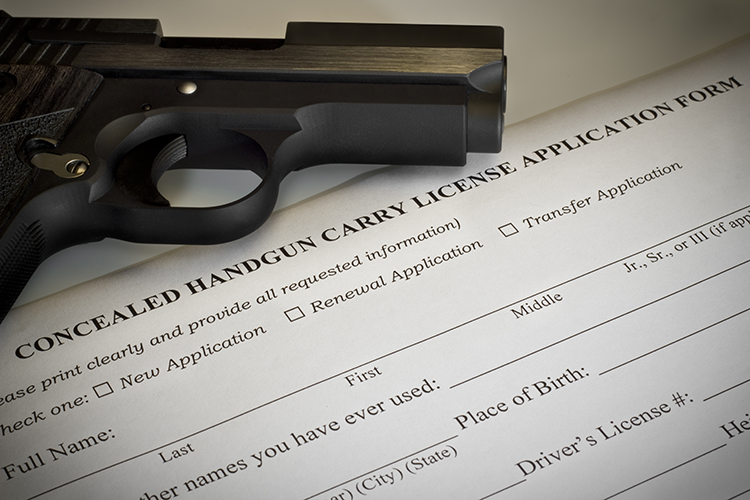New York and other states have the right to limit concealed weapon permits, ABA says in amicus brief

Image from Shutterstock.
State and local governments have long had the right to tailor firearm regulations to their own judgments about how best to protect public health and safety, the ABA told the U.S. Supreme Court on Tuesday.
In an amicus brief filed in New York State Rifle & Pistol Association Inc. v. Bruen, the ABA noted that governments consider population density, access to first responders and other characteristics of their communities when creating concealed-carry regulations. Governments also weigh potential risks, including whether minor incidents could escalate into life-threatening situations and whether criminals and other people who should not have guns could gain increased access to them.
The association additionally said many states use concealed carry regulations to protect victims of domestic violence who could potentially be harmed in public spaces.
“In the ABA’s view, it would be disruptive to centuries of settled practice—and deleterious to the protection of human life—to revoke state and local governments’ flexibility to balance these interests in fashioning concealed carry regulation,” according to its brief.
The Supreme Court agreed in April to decide whether the state of New York violated the Second Amendment when it denied applications for concealed-carry permits for self-defense.
The New York State Rifle & Pistol Association and two individuals sued a New York licensing officer and the superintendent of the New York State Police in the U.S. District Court for the Northern District of New York after the individuals were not granted unrestricted firearm-carry licenses.
The district court dismissed the case for failure to state a claim, and according to an ABA press release, said clear precedent of the 2nd U.S. Circuit Court of Appeals at New York showed the state’s handgun licensing law did not violate the Second Amendment. The appeals court had upheld New York’s regulations in Kachalsky v. County of Westchester in 2012.
The 2nd Circuit issued a summary order upholding the district court’s decision in the present case last year.
In asking the Supreme Court to affirm the 2nd Circuit, the ABA said “respecting State and local government reliance interests is fully compatible with the Second Amendment.”
The association cited the 2008 decision in District of Columbia v. Heller, in which the Supreme Court held that while the Second Amendment protects an individual’s right to possess a firearm and to use it for self-defense within the home, the right is not without limits.
“Nothing in our opinion should be taken to cast doubt on longstanding prohibitions on the possession of firearms by felons and the mentally ill, or laws forbidding the carrying of firearms in sensitive places such as schools and government buildings, or laws imposing conditions and qualifications on the commercial sale of arms,” the Supreme Court wrote in Heller.
The ABA said in its brief it has studied firearm regulation for more than a century and began debating and issuing policies related to firearms after the assassination of President John F. Kennedy in 1963.
In a resolution adopted in 2011, the association said it supports laws giving law enforcement and other authorities broad discretion to determine whether concealed-carry permits should be issued in jurisdictions that allow the carrying of concealed weapons.
Oral arguments in New York State Rifle & Pistol Association Inc. v. Bruen are scheduled for Nov. 3.



